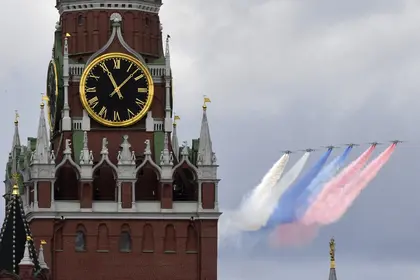On Mar. 14, 2023, two Russian Su-27 fighters damaged an American MQ-9 Reaper drone which was carrying out a regular mission over the Black Sea. That was the first direct confrontation between the two nuclear states since the 1962Cuban crisis.
Russia would consider defeat in the war against Ukraine as a loss to NATO. And given its dismissal of the complaints by European states neighboring Ukraine when missiles from the massive attacks against Ukraine’s civilian population strayed onto their territory, Russia is not going to stop.
JOIN US ON TELEGRAM
Follow our coverage of the war on the @Kyivpost_official.
What does that mean for the West? That Russia is becoming more aggressive, dangerous, and unpredictable. The Kremlin will definitely continue provoking the Alliance, checking the limits of what is permitted, and go further and further if there is no proper response. This is the whole essence of Putin’s system: in 2008 – the Russian Federation invaded Georgia and the response was weak; in 2014 – it invaded Ukraine and the response was insufficient, we heard only traditional “concerns”; in 2022, it started a full-scale war in the middle of Europe. If we don't cut off the aggressor's tentacles now, we don't know who will be next. Ukrainians have learned the lesson in the hard way, that unpunished evil always returns. The world had better learn this lesson from the Ukrainian experience now, rather than from its own in the future.
After a year of the full-scale invasion, it's absolutely clear that Western sanctions haven’t hit the Russian economy hard enough. And although Russian revenues from the sale of energy carriers decreased by 46%, Putin is still able to keep its war machinery in place. This in no way means that sanctions do not work. This means that more and more diverse economic pressure is needed. Confiscation of Russian assets is a very important tool here.
A representative of the US Republican Party has already said that in response to the incident with the MQ-9 Reaper drone, Washington should confiscate Russian assets in the U.S. Ultimately, this mechanism is in the interests of both the US and Ukraine. And the United States, as the leader of the Western world and democratic values, should take the upper hand in the process of building a new security system, where tyranny cannot dictate the rules of the game or break the world's legal order.
Canada has become a pioneer in the confiscation of Russian assets, introducing legislation, that allowed it to confiscate Roman Abramovich's money and to transfer it for the restoration of Ukraine. The U.S. was next. At a meeting last year with the then Speaker of the House of Representatives Nancy Pelosi, Ukraine received assurances of support for the confiscation of Russian assets. And at the end of 2022, the U.S. adopted an amendment that led to the confiscation of assets belonging to the Russian oligarch, Konstantin Malofeev.
Unsurprisingly, these decisions caused real hysteria in Russia especially now that the U.K. is currently considering its own changes to its legislation to allow the confiscation of Russian funds.
When proposals for the confiscation and transfer of Russian money to Ukraine were first raised, many were skeptical. But Bill Browder, the initiator of the Magnitsky Act, believed in us and it was inspiring. It was understood that implementation would take a lot of time, meetings, negotiations, and effort, but it would be worth it.
Currently the Ukrainian government assesses that repairing the damage from the full-scale invasion will be around $700 billion while seized Russian assets are worth $350 billion. It is quite logical that this money should be used to aid Ukraine’s recovery, rather than taxpayers' money in partner countries. The understanding is there, the political will to implement it is also there, and effective legal mechanisms for implementation are currently being developed.
Our overall goal is to seize Russia’s sovereign assets. Currently, $350 billion from the of the Russian Federation Central Bank is frozen and held in the U.S., France, Japan, Germany, the U.K., Austria and Canada, with another $90 billion held by international institutions and other countries.
Discussions are ongoing in the EU on whether or not to confiscate the frozen sovereign assets of the Russian Federation and transfer it to Ukraine or seek other uses. The chairman of the European Council, Charles Michel, suggests looking for mechanisms to invest this money and give the profits to Ukraine.
Estonian Prime Minister Kaja Kallas has her own vision: to take a "loan" using Russian Assets as collateral and then return the funds when a reparations agreement is signed by Russia. It seems likely that Estonia will be the first EU country to put such a mechanism into operation.
Confiscation of Russian assets is a powerful tool to weaken Putin and his regime. That wouldn’t require direct military intervention by the West and this pragmatic tightening of the economic screws, which deprives the regime of money, will cause maximum tension and demonstrate his impotence in Russia.
We should not be afraid of escalation, that has already taken place. We should be afraid that our indecisiveness feeds the Kremlin and frees its hands. This indecision will merely strengthen the Russian Federation and lead to new wars.
This is not only about justice for Ukrainians. Winning the war in Ukraine together is a chance to counter the imperial ambitions of the Kremlin and ensure the future of democracy. The civilized world should send a much clearer signal to all dictators that aggression will not go unpunished.
You can also highlight the text and press Ctrl + Enter



